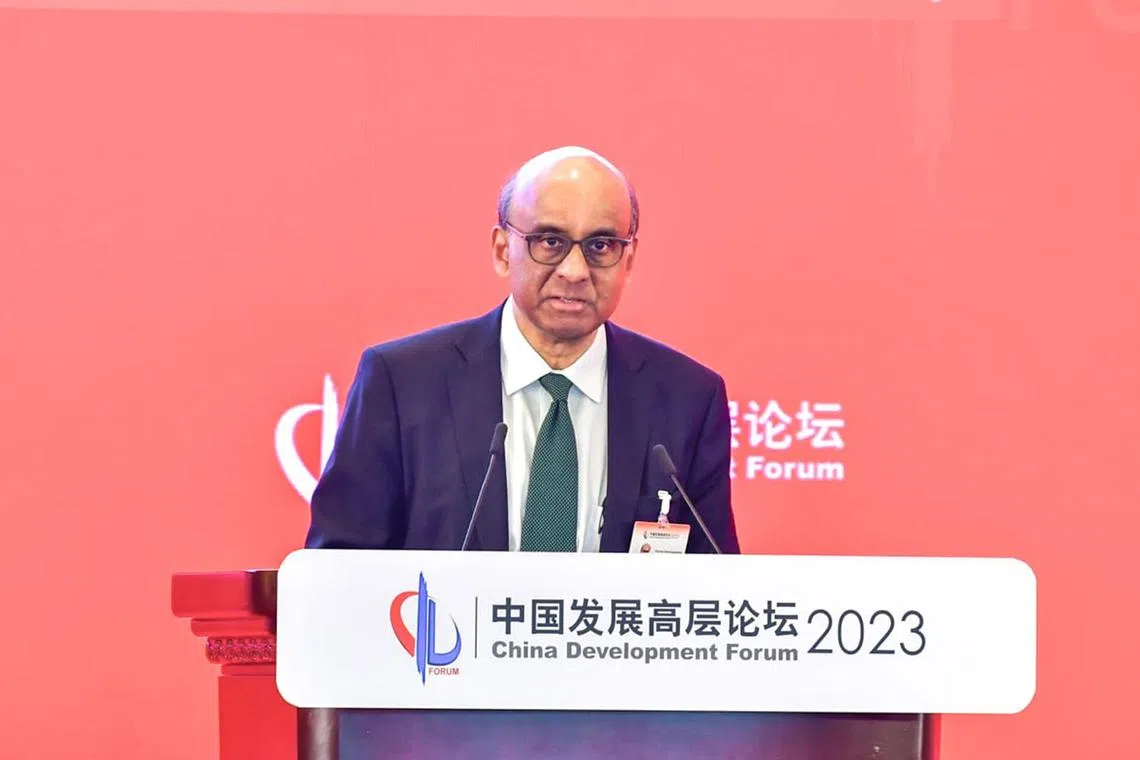US-China competition, cooperation will have ‘great bearing’ on world: Tharman
Sign up now: Get insights on Asia's fast-moving developments

Singapore's Senior Minister Tharman Shanmugaratnam said the US-China tension and the way it is managed will have great bearing on the global economy and on all nations.
PHOTO: CHINA DEVELOPMENT FORUM
BEIJING – China and the United States need to find a way to combine competition with cooperation because their rivalry has repercussions throughout the rest of the world, said Singapore’s Senior Minister Tharman Shanmugaratnam on Sunday.
“(The) US-China tension, and the way it is managed, will clearly have great bearing on the global economy, great bearing on all nations,” he told an audience of global business leaders and officials at the China Development Forum in Beijing.
Calling this an era where there is competition on a scale that has “never been seen before”, he said this should also be a time when the world’s two largest economies should cooperate to address the current challenges facing humanity: climate change, a global water crisis, the loss of biodiversity, as well as traditional challenges such as global terrorism and nuclear proliferation.
Relations between Washington and Beijing have worsened in recent years, beginning with a bruising trade war during the Trump administration that has since evolved into a technological arms race, with the US choking off Chinese access to cutting-edge technology.
China, meanwhile, accuses the US of interfering with what it says are its domestic politics, including the self-ruling island of Taiwan that Beijing sees as its own.
Mr Tharman said: “How the US and China are able to combine competition – including perfectly legitimate, economic competition – with the need for cooperation is going to require considerable strategic ambition and skill.
“But it will matter to the US; it will matter to China; and very importantly, it will matter to the world.”
The international community also needs to shift from simply reacting to shocks and disruptions, such as pandemics and financial crises, to pre-empting and preparing for such events by investing in public goods, he said, which include research and development and healthcare infrastructure.
“We know how to do it, but we’re putting very little resources into it globally. It is remarkable how after the worst pandemic in living memory, we’re going back to normal – a very small amount of resources is being set aside to prepare for the next pandemic,” he said, referring to the Covid-19 pandemic that dealt a body blow to the global economy.
“We are reverting to economic irresponsibility and the political myopia that risks future catastrophe.”
Mr Tharman’s speech also contained themes he has recently championed, such as lifelong learning, as well as building global optimism and openness.
He called on countries to keep the global economy open, even as many make shifts to build up individual capacity, saying that the protectionist policies of late risk fragmenting, even breaking up, the global economy.
“Everyone will be worse off for that. Innovation will suffer; productivity growth will suffer; each of the blocs will suffer,” he said.
Mr Tharman was speaking during a session on macroeconomic policies and economic recovery. Other speakers included International Monetary Fund managing director Kristalina Georgieva;
Touted as China’s answer to the Davos World Economic Forum, the China Development Forum welcomed attendees including the heads of multinational companies such as Apple’s Tim Cook, Pfizer’s Albert Bourla and Samsung’s Lee Jae-yong.
On Saturday, a group of American “friendly organisations and individuals” also met Chinese Foreign Minister Qin Gang, said the Ministry of Foreign Affairs. Attendees at the meeting included Mr Bourla, US-China Business Council president Craig Allen and Qualcomm chief executive Cristiano Amon, a photo accompanying a Foreign Ministry statement showed.
Amid frosty bilateral tensions between the US and China, American executives have been circumspect about being seen as hobnobbing with the Chinese, fearing a fallout back home.
During the meeting, Mr Qin said China‘s post-Covid-19 reopening, both economically and socially, and economic recovery are a triple benefit for the American business community. “Regrettably, however, China-US relations are still chilly this spring,” he said.
Noting that China’s stance on bilateral relations has not changed, he added: “China has always advocated for mutual respect, peaceful coexistence and win-win cooperation between China and the US.”



